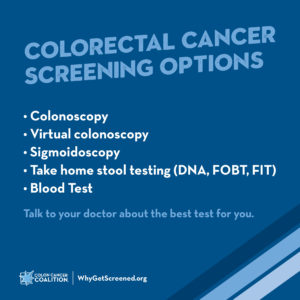Early diagnosis of colon cancer is the key to surviving the disease. When detected in its early stages through screening tests, 90% of colon cancer cases are preventable, treatable, and beatable.
The Centers for Disease Control recommends the following tests for colorectal cancer screening: colonoscopy, sigmoidoscopy, and at-home stool testing.
VISUAL-BASED SCREENING
These tests visually review the inside of the colon. A full colon prep is required on the day before each of these screening options. The colon prep is considered to be the most difficult part of the procedure. There are things you can do, however, to make your prep day more tolerable.
 Colonoscopy. This procedure is considered the gold standard for detection of colon cancer. During a colonoscopy, your gastroenterologist uses a scope to look at the inside of your colon for polyps or evidence of cancer. Your doctor will talk with you about sedation options to make the procedure as comfortable as possible. If polyps are found, they are removed during the exam and sent to a lab for further examination. The exam takes about 30 minutes to complete, and requires a full colon cleansing on the day before the test. Colonoscopies are also used as a follow-up test if anything unusual is found during another screening test.
Colonoscopy. This procedure is considered the gold standard for detection of colon cancer. During a colonoscopy, your gastroenterologist uses a scope to look at the inside of your colon for polyps or evidence of cancer. Your doctor will talk with you about sedation options to make the procedure as comfortable as possible. If polyps are found, they are removed during the exam and sent to a lab for further examination. The exam takes about 30 minutes to complete, and requires a full colon cleansing on the day before the test. Colonoscopies are also used as a follow-up test if anything unusual is found during another screening test.
How often: With normal results, a colonoscopy screening is repeated every 10 years. The test may be repeated more often if a polyp is found or family history warrants more frequent testing. Follow your doctor’s recommendations.
CT Colonography (or virtual colonoscopy). The screening test uses a special x-ray to examine the colon for polyps or cancer. It also requires a complete colon prep, but does not require sedation. If evidence of polyps or cancer is found, a follow-up colonoscopy may be recommended.
How often: With normal results, a virtual colonoscopy is repeated every 5 years.
Sigmoidoscopy. Like a colonoscopy, your doctor might recommend a sigmoidoscopy to look for polyps or evidence of cancer. During this test, however, the doctor only examines the rectum and part of the colon. A sigmoidoscopy takes only 10-20 minutes to complete, and requires a full colon cleansing the day before the test. If evidence of cancer is found, a colonoscopy is generally recommended so that the physician can look at the entire colon for signs of disease.
How often: Every five years with FIT/FOBT every three years.
AT HOME SCREENING
These tests detect abnormalities in your stool and can be done in the privacy of your home. Return the test kit to your health care provider where samples are checked for the presence of blood or cancer cells. If evidence of blood or cancer cells are found, further testing (including a colonoscopy) becomes necessary.
Fecal Immunochemical Test (FIT). FIT tests uses antibodies to detect blood in the stool.
How often: once a year.
High Sensitivity Fecal Occult Blood Test (FOBT). The FOBT is one of the most common tests used to screen for colon cancer by checking for blood in the stool.
How often: once a year.
DNA Stool Test. (i.e. Cologuard) This at-home test detects hemoglobin (proteins in blood) in stool samples. The FDA approved test can also detect certain DNA mutations in cells shed by advanced adenomas as stool moves through the large intestine and rectum.
How often: Every three years, or check with your health care provider.
AT YOUR DOCTOR’S OFFICE
A simple blood test. A blood draw done at the doctor’s office for average-risk patients who are unable or unwilling to complete a colonoscopy or FIT.
How often: once a year.
TALK TO YOUR DOCTOR
Your health care provider can provide more information about the best test for you based on your health history, symptoms, and risk level.
INSURANCE COVERAGE
Coverage for preventative screening for colorectal cancer is required by the Affordable Care Act. As of May 2021, patients over the age of 45 with an average risk for developing colon cancer should begin screening for the disease. As this is a new recommendation, coverage for screening at 45 varies by state and insurance company. Talk to your insurance company to make sure you are covered for screening at 45!
Don’t wait until you are 45 to talk to your doctor about screening.
Reasons to get screened for colon cancer also include:
- If you are experiencing symptoms.
- If you have been diagnosed with inflammatory bowel disease (like Crohn’s disease or ulcerative colitis).
- If your parents or immediate family members have had polyps, talk to your doctor about starting screening at an age 10 years before their polyps were discovered.
- If you have a family history of colon cancer or a genetic syndrome like Lynch syndrome (hereditary nonpolyposis colorectal cancer) or FAP (familial adenomatous polyposis).
Important! If you feel your concerns are being ignored by your current physician, don’t be afraid to seek a second opinion and continue to request screening. You are your own best advocate and should feel empowered to take control of your health.
More information about screening options is available from the CDC.
Information on these pages is provided for informational purposes only. Consult your own physician before making any medical decisions.
